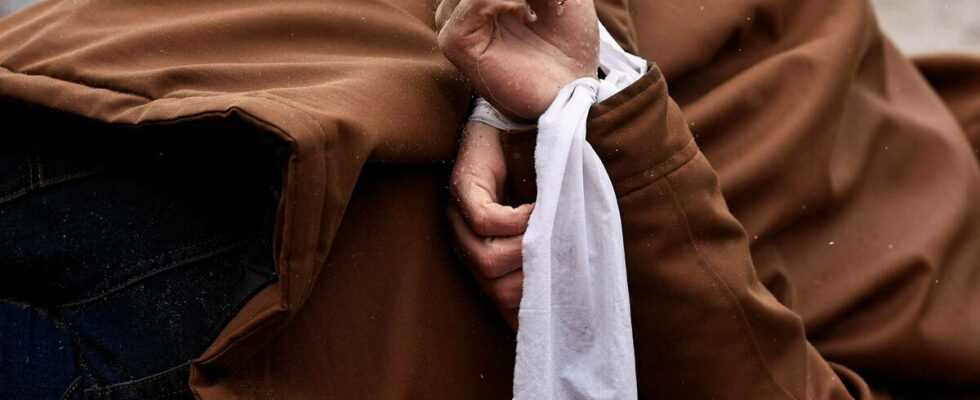The images of civilians killed in the Kyiv region provoke a cascade of condemnations from Western leaders and revive the debate on Russian gas imports. European leaders met urgently on Monday to discuss new measures.
Wearing his traditional khaki clothes and a bulletproof vest, Ukrainian President Volodymyr Zelensky visited the scene of the Boutcha massacre on Monday to see for himself the ravages of war. The day before, the images of the bodies of civilians tied up and executed or of improvised mass graves had highlighted the consequences of the presence of the Russian army in the Kyiv region, where at least 410 civilians have already been found dead, according to the authorities. “We know that thousands of people have been killed and tortured, that they have had their limbs cut off, that women have been raped,” declared the head of the Ukrainian state.
These abuses against civilians, described as “war crimes” by several Western capitals, could be a turning point in Russia’s war in Ukraine. The European Union and the United States are considering toughening sanctions against Moscow to end the fighting.
The unbearable images of the massacres near Kyiv caused an outcry. And cascading and unanimous condemnations from Western countries. At the UN, Michelle Bachelet, the High Commissioner for Human Rights, said “horrified” by the discovery of this information which “raise serious and disturbing questions about possible war crimes”. Remarks echoed by French President Emmanuel Macron, who spoke of “very clear indications of war crimes” and felt it was “almost certain” that the Russian army was responsible for the massacre. Spain and Poland went even further, talking about a possible “genocide” and demanding the creation of an international commission of inquiry. Russia, for its part, is content to deny any abuse and to denounce signs of “video falsifications” by the Ukrainian authorities. Moscow has even called for a meeting of the UN Security Council to decide on the “hateful provocations” committed by “Ukrainian radicals”.
Will the Boutcha carnage be a red line for the West? While Washington has announced “additional penalties” against Moscow, EU member states met “emergency”, Monday morning, to discuss the implementation of new restrictive measures. The Europeans, who want to avoid any direct confrontation with Russia, still consider economic reprisals as the only way to reduce Moscow’s expansionist tendencies. However, the sanctions put in place so far – asset freezes and restrictions abroad of certain oligarchs and entities, exclusion from the Swift banking system of several Russian banks, closure of European airspace… – have not prevented Vladimir Putin to continue funding his war effort. Moreover, the withdrawal of Russian troops from the suburbs of Kyiv does not herald a capitulation of Moscow but rather the redeployment of its efforts on “the liberation of Donbass”, where the locals are preparing for a major offensive. The situation is “tense” in this region, said Monday the governor of the region who called on the civilian population to evacuate.
“Huge dilemma”
On the fortieth day of the invasion, Ukrainian Foreign Minister Dmytro Kuleba again urged G7 countries to adopt more draconian measures, including closing ports to Russian ships and an oil embargo. Emmanuel Macron spoke on Monday about individual sanctions and measures on coal and oil, without mentioning gas purchases. It is precisely on this question that Westerners are struggling to find a consensus. Especially since in response to Western sanctions, Russia announced on Thursday that consumers of Russian gas in countries “unfriendly” will now have to pay their bills in roubles. A measure that mainly targets the Old Continent, of which around 40% of consumption comes from Russia. Rates that reach 55% in Germany and more than 75% in Finland or the Czech Republic – far from those of the United States or the United Kingdom, which imposed an embargo on their imports of Russian oil and gas from the first days of the invasion.
“Europeans know that the ultimate penalty will be gas. But for countries dependent on Russia, this is a huge dilemma. Cutting off Russian gas will lead to the closure of businesses, thus increasing unemployment, and will have an impact on consumers,” analyzes Sylvie Matelly, Deputy Director of the Institute of International and Strategic Relations. A recent study published under the aegis of the French council for economic analysis estimates, however, that the end of energy imports from Russia would have a “relatively low impact” on European economies, with a loss of GDP of between 0.2% and 0.3%.
“These sanctions do not work”
On Saturday, Lithuania thus became the first EU country to announce the end of gas imports from Russia, calling on the rest of the continent to do the same. In the aftermath, Latvia and Estonia, which are respectively almost 100% and 93% dependent on Russian natural gas, took the same initiative. The three Baltic countries are now served by reserves stored underground in Latvia. For Sylvie Matelly, the offensive position of the Baltic countries and Eastern Europe is explained by “geographical proximity to Ukraine and a visceral fear of being affected by war”.
Against the current, Germany, whose Minister of Defense had declared Monday morning for an immediate halt to the import of Russian gas, declared a few hours later that it could not do without these deliveries. “short term”. the Polish Prime Minister Mateusz Morawiecki believes that Berlin is “the main obstacle to [mesures] very strong” of the EU. “Clear and determined sanctions are necessary. These sanctions don’t work.” he regretted, before challenging the French head of state: How many times did you negotiate with Putin, what did you get? We don’t debate, we don’t negotiate with criminals […] Nobody negotiated with Hitler.” President Zelensky attacked former French President Nicolas Sarkozy and former German Chancellor Angela Merkel on Sunday, calling on them to come to Boutcha to see “what the policy of concessions towards Russia has led to”.
